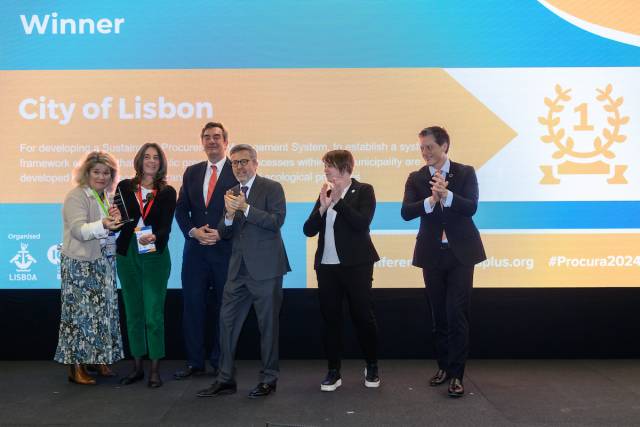The Norwegian Central Procurement Body, the City of Malmö (Sweden) and the City of Lisbon (Portugal) were the big winners of the 2024 Procura+ Awards, revealed during the 2024 Procura+ Conference (held on 13 & 14 March in Lisbon). The Procura+ Awards reward successful, already running, sustainable, circular and innovation public procurements that have led to significant improvements of public goods, services, processes and infrastructure.
The Norwegian Central Procurement Body won in the category Sustainable Procurement of the Year, which sought to reward procurements which integrate aspects of sustainability, including environmental, economic, circular and social elements. It especially aimed ageny showcase procurements which include a strategic and therefore holistic approach to implementing public procurement. The two finalists in this category were the Dutch Custodial Institution Agency and the Greater London Authority.
The Norwegian organisation won with its call for tender for a framework agreement for the reuse and recycling of ICT equipment. The requested services included collection, transport, secure data disposal, and sorting of ICT equipment for reuse or recycling. Requirements were also set for worklife inclusion, adding a social aspect to the contract. In order to give priority to bidders with business strategies that maximise reuse over recycling and with profit-sharing models more advantageous for the administration, the contract award criteria were divided between quality (70%) and price (30%) criteria.
The category Innovation Procurement of the Year looked at procurements which use innovative approaches in their purchasing practices, as well as those that foster innovation by purchasing cutting-edge products, services and works and see the public authority as a launch customer, driving sustainable development. The finalists in this category were the Municipality of Bodø (Norway) and the Belgian Agency for Roads and Traffic, with the City of Malmö winning.
The City of Malmö won for developing procurement criteria to be used in several tenders based on universal design principles. The tender specifications outlined the seven principles of universal design, as defined by the Centre for Universal Design at North Carolina State University, and required furniture to meet at least the first two principles (e.g. equitable use and flexibility of use). The city also developed "variety cards" that provide guidance to designers and others working to improve accessibility and usability. By encouraging suppliers to systemically take into consideration accessibility issues, the City of Malmö is promoting an integral approach to accessibility and inclusion and ensuring that the approach is sustained in the longer term.
Finally, the category Procurement Initiative of the Year, focusing on outstanding public procurement initiatives, such as programmes, policies, actions, guidance and tools that contribute towards strategic, sustainable, circular and innovation procurement, saw the City of Lisbon winning. The finalists in this category were Barcelona City Council (Spain) and the Lithuanian Public Procurement Office.
The City of Lisbon developed, in line with the recommendations of the ISO 20400 Sustainable Procurement standard, a Sustainable Procurement Management System, whose objective was to establish a systematic framework ensuring that all public procurement processes within the municipality are developed within responsible, transparent, fair, and ecological principles. The approach was designed to provide clear guidance and strategies to facilitate easy application of sustainability criteria in all procurement processes. This involved implementing stringent measures to prioritise environmental and social responsibility, transparency, and equitable access for all stakeholders, aspiring to exceed legal and ethical requirements, setting a higher standard for sustainable procurement in the public sector. Central to this initiative was a robust Code of Conduct for Suppliers, emphasising sustainability.
The winners in the three categories were decided by a jury consisting of Jorge Laguna Celis, Director of UNEP's One Planet Network, Jorge Conesa, Managing Director of the Fair Trade Advocacy Office (FTAO), Mark Hidson, Global Director of ICLEI's Sustainable Procurement Centre, and Erika Bozzay, Senior Policy Adviser at the Infrastructure and Public Procurement Division, OECD.
For more in-depth information on the succesful projects of the winners and the finalists, visit the Procura+ Website. There you will also find an overview of the winners from past editions of the Procura+ Awards.





